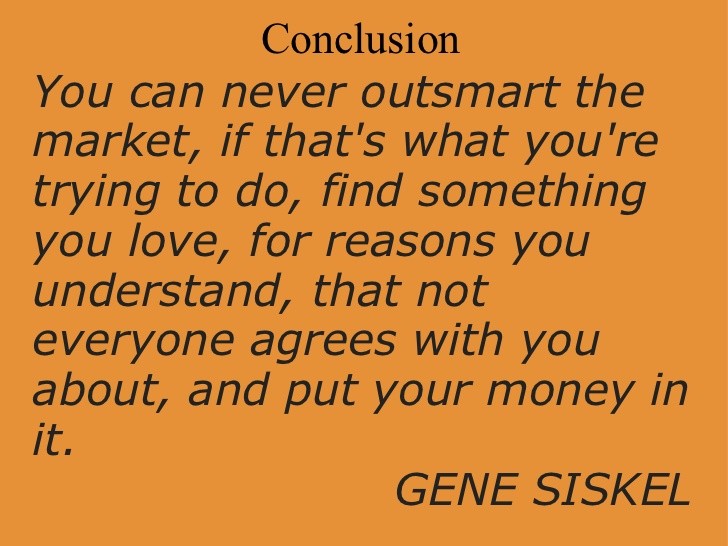The Market Outsmarts Everyone
Post on: 16 Март, 2015 No Comment

55 Oct 10, 2014 9:03 AM EDT
Stated simply, the Efficient Markets Hypothesis, or EMH, is this: Anything you know, the market already knows. So the EMH says that you can’t make money in financial markets by trading based on information. If you discover that a company is going to make more profit, you can’t make money by buying its stock. If you find some pattern in past stock prices, it will disappear before you can make money exploiting it. This might sound like an odd definition of “efficiency,” but what it means is that financial markets are very good at assimilating information.
It has become very fashionable to ridicule and dismiss the EMH. This is understandable, given the financial crisis we just went through, and the series of bubbles and mini-crises we experienced before that. John Quiggin, an economist whom I highly respect, has called it a zombie idea. Just recently, blogger Dan Davies called for the theory to be expunged from the economics curriculum:
(The EMH) idea, once referred to by Michael Jensen as “the best established fact in all of social sciences”, is actually close to being one of the most decisively refuted. Momentum effects exist. fund companies like AQR have been offering funds based on them, and generally outperforming, for ages. Robert Shiller’s share of the Nobel Prize was for noticing that securities prices are, in general, much too volatile to make sense as forecasts of anything in the real world.
This is all true. Data has shown that the EMH — in any form — is wrong.
But you know what other scientific theory is wrong? Newton’s Laws. They leave out relativity and quantum mechanics, two things so important that without them, all matter would collapse and the universe as we know it couldn’t exist. As a theory of everything, Newton’s Laws aren’t just wrong — they’re catastrophically wrong.
Yet we still teach Newton’s Laws in high school and it’s the first thing kids learn in physics. Should we expunge F=ma from the curriculum? I don’t think so. Because Newton’s Laws are incredibly useful in real life. Using Newton’s Laws, you can land astronauts on the moon or hit Moscow with a missle. You don’t have to use any relativity or quantum mechanics — in fact, using those things would only make the task harder. Newton’s Laws don’t just work, they’re actually the best tool for the job.
Do we really want to call a theory that lets you do all that stuff wrong? If so, I think we have a bad definition of what wrong means. You can’t just say a theory is false or refuted; you have to show how much it gets things wrong, and when.
The fact is that the holes poked in the EMH are quantitatively small. Short-run momentum and long-run reversion, the two most enduring anomalies — which may both occur because of the importance of the one-year horizon in investing — are enough to make you a bit of extra money, but not an enormous amount, unless you can borrow a lot of money to leverage your bets and can absorb large losses when the anomalies don’t work.
The EMH, on the other hand, will allow you to do something almost as impressive as landing astronauts on the moon — construct a portfolio in few minutes that outperforms most professional money managers and the vast majority of individual investors. Just buy an index fund! Or, these days, buy some exchange-traded funds. No, this isn’t the optimal possible investment strategy. But it is better than most of what’s out there. And the strategy was invented by simply applying the EMH.
If you want to call that idea false, then be my guest, but I think we should keep on teaching it.

Now, the analogy between the EMH and Newton’s Laws is far from perfect. Newton’s Laws are wrong in a finite set of ways, under conditions that are predictable and well-known. The EMH, in contrast, is wrong in an infinite number of ways, and the set of the most important ways in which it’s wrong is constantly changing, as old anomalies are traded away and new ones crop up. Also, the EMH is actually a family of hypotheses, since you need a model of risk to specify it properly.
But like Newton’s Laws, the EMH is deep and fundamental. If you went through a wormhole and visited an advanced alien civilization, what would they think about financial markets? Chances are, they wouldn’t use the Capital Asset Pricing Model. or the Fama-French 3-Factor Model. or the Shiller CAPE. But I bet they would have some version of the Efficient Market Hypothesis.
This is because the EMH doesn’t emerge from any peculiarity of the way our market system is set up, or the way human beings behave. The EMH comes from something much deeper than that, something that probably has to do with information theory. It comes from the fact that when you exploit information to make a profit in a financial market, you decrease the amount that others can exploit that information. In other words, the financial value of information gets used up. That sounds simple and obvious, but so are the principles that give rise to Newton’s Laws.
In any case, the anomalies that make the EMH not quite right may also have deep explanations, but we don’t know what those are yet. When we do, that will be a big advance in finance theory. But the EMH will still be the jumping-off point for any theory of financial markets, on this planet or any other. It will always be wrong, but never useless.
To contact the author of this article: Noah Smith at noahsmith.bloomberg@gmail.com .
To contact the editor responsible for this article: James Greiff at jgreiff@bloomberg.net .














